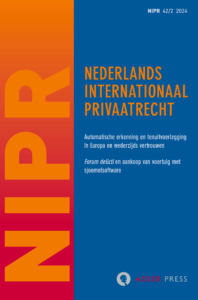The most recent subject of the Dutch Journal on Non-public Worldwide Legislation (NIPR) has been printed.

NIPR 2024 subject 2
EDITORIAL
M.H. ten Wolde / p. 239
Article
C.G. van der Plas, A.F. Veldhuis, B.H.B. Verheul, Automatische erkenning en tenuitvoerlegging van vonnissen in het Europa van nu: de noodzaak van een nieuwe blik op wederzijds vertrouwen na J/H Restricted / p. 241-267
Summary
This text explores the idea of mutual belief within the context of the popularity and enforcement of judgments underneath Brussel Ibis. Backslidings within the rule of regulation in Member States comparable to Hungary and Poland have solid doubts on the reliability of mutual belief in judicial cooperation. The Court docket of Justice of the European Union (CJEU) has additional difficult the problem of mutual belief in its ruling in J/H Restricted. The CJEU held that judgments from third international locations, which have been or may have been able to being topic to an inquiry in adversarial proceedings in a Member State, end in a ‘judgment’ throughout the which means of Article 2a Brussels Ibis.
This text critically assesses whether or not the idea of mutual belief justifies the (oblique) computerized recognition and enforcement of third-country judgments underneath Brussels Ibis. It examines the content material of the precept of mutual belief and argues that – though mutual belief is of basic significance for European integration – mutual belief have to be balanced with sufficient safeguards to guard basic rights in accordance with the jurisprudence of the European Court docket of Human Rights. Whereas the general public coverage exception of Article 45 of Brussels Ibis is usually scrutinized for its effectiveness in addressing human rights violations, the evaluation reveals that the present safeguards may not at all times be environment friendly within the context of third-country judgments underneath Brussels Ibis. By re-evaluating the precept of mutual belief within the context of third-country judgments, the article underscores the need of a extra nuanced method to mutual belief.
Case regulation
M.H. ten Wolde, Het discussion board delicti en de aankoop van een van sjoemelsoftware voorzien voertuig. Nadere uitleg van het Hof van Justitie EU. HvJ EU 22 februari 2024, C-81/23, ECLI:EU:C:2024:165, NIPR 2024-515 (MA tegen FCA Italy Spa, FPT Industrial SpA) / p. 269-274
Summary
On this judgment on Article 7(2) Brussels Ia Regulation (No. 1215/2012), the ECJ clarifies its earlier judgment of 9 July 2020, C-343/19 (VKI/Volkswagen). In that judgment, the Court docket had dominated that the place a producer in a Member State has unlawfully geared up its automobiles with software program that manipulates information referring to exhaust fuel emissions earlier than these automobiles are bought from a 3rd occasion in one other Member State, the place the place the harm happens (the ) is in that latter Member State. Whereas within the VKI/Volkswagen case, buy and supply passed off in the identical Member State (Austria), within the current case, the acquisition passed off in Germany however the automobile was really delivered in Austria the place the purchaser had made regular use thereof. This prompted the Oberster Gerichtshof in Austria to refer a preliminary query to the ECJ as to what ought to depend because the place of buy in these specific circumstances: the place the place the contract of sale for the automobile was concluded, the place the place the automobile was handed over to the ultimate purchaser or the place the place it was utilized in accordance with its vacation spot? In line with the ECJ, the place the place the manipulated automobile was really handed over to the ultimate purchaser is the one usable criterion and that place ought to subsequently be considered the place of buy (and the Erfolgsort).














![One-Week Faculty Development Programme (FDP) on Literature as a Repository of Indian Knowledge Systems by NLU Tripura [Online; Aug 25-30; 7 Pm-8:30 Pm]: Register by Aug 24](https://i2.wp.com/cdn.lawctopus.com/wp-content/uploads/2025/08/Faculty-Development-Programme-FDP-on-Literature-as-a-Repository-of-Indian-Knowledge-Systems-by-NLU-Tripura.png?w=120&resize=120,86&ssl=1)








